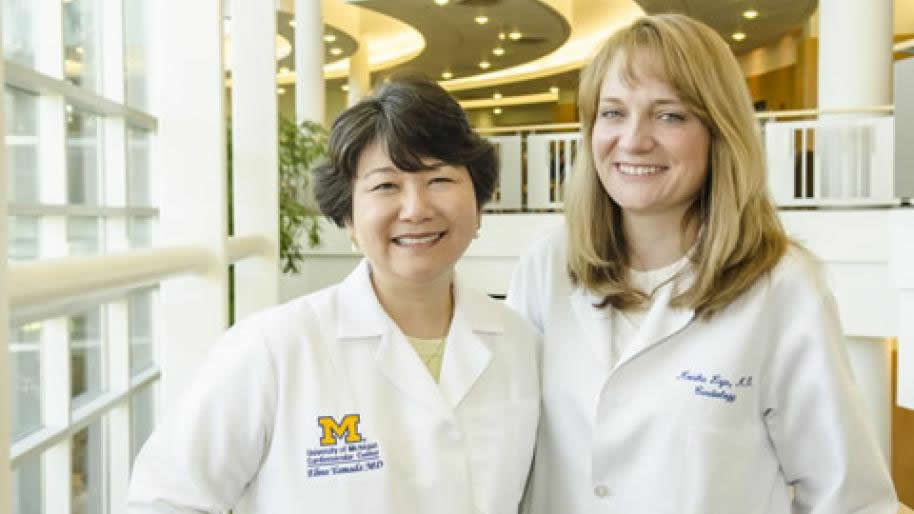Take Heart
Keep your heart healthy during and after cancer

To make an appointment at the cardio-oncology clinic, call 888-287-1082.
Photo by Edda Pacifico
As the incidence of cancer increases, so does treatment survival. Kids with cancer often grow into adulthood. Adults with cancer can make it to old age. In other words, more people are being treated and are having better outcomes than ever before.
With all this advancement in cancer care, another health issue began to emerge in survivors: heart disease. We sat down with Elina Yamada, M.D., and Monika Leja, M.D., from the Michigan Medicine's new Cardio-Oncology Program, to understand how cancer treatment can affect the heart.
What does the new Cardio-Oncology Program offer patients?
Our clinic will give patients care from cardiologists well-versed in toxicities related to cancer treatment that most cardiologists don't know much about.
We understand cancer drugs and treatments and how they can affect your heart. This will allow us to provide support to the Rogel Cancer Center’s oncology teams by:
- optimizing your heart problem if you have one prior to cancer treatment
- preventing heart disease if you are at risk
- monitoring closely for cardiac problems if you are receiving any potentially cardiotoxic cancer treatment
- treating cardiac problems related to cancer treatment promptly so you can continue cancer treatment
Your cancer care and cardiac care will be multidisciplinary and coordinated. It is unique to have a cardiologist who is aware of issues surrounding cancer treatment.
There are only a few places in the country that are starting work in this area.
What can patients do to prevent heart disease from becoming a long-term issue?
If you have cancer and want to avoid heart problems in the future because of treatments with potential cardiotoxicity, you should attempt to:
- lead a healthy lifestyle
- eat a low-cholesterol diet
- get regular exercise, such as daily walks
- control your blood pressure
- attempt to control your blood sugar levels
- avoid obesity
Get a home blood pressure cuff to ensure your blood pressure is in the normal range: less than 140/90 and higher than 100/50 mmHg. People seem to understand high blood pressure is not good. Low blood pressure is not good either and can lead to dizziness, fainting, lack of blood flow to the heart or even kidney failure.
Under what circumstances would a patient come to your clinic?
We treat cancer patients who develop cardiac problems and cardiac patients who are diagnosed with cancer. Some cancer patients develop heart issues during treatment, and we evaluate how we can treat their heart without compromising their cancer care. Some heart patients are told they can't get cancer care because of their heart issues. This is not always true. In many circumstances, heart issues can be treated and patients can become candidates to have needed cancer treatments.
Our goal is to detect heart issues as early as possible. Patients must communicate the following symptoms to their cancer doctors as soon as possible:
- shortness of breath
- chest pain
- heart palpitations
- fluid retention in the legs
- distention of the stomach
- dizziness
To make an appointment at the cardio-oncology clinic, call 888-287-1082.
Read the Winter, 2013 issue of Thrive.
